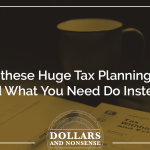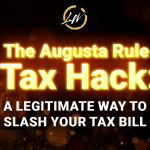In this episode, we discuss two end of the year tax strategy misconceptions that you should avoid. We’ll also deep dive on how to think big picture when you’re making your tax plan.
Sometimes, our well-meaning accountants make strategy suggestions. However, these suggestions may not feel quite right. This unease is especially true when you take the long view on your tax planning and question whether what you’re doing is a tax saving or merely a tax deferment.
Join us as we explore two tax misconceptions that could end up costing you big money in the future.
Tax Misconceptions and Big Picture Planning for Taxes
- What to do when your not in agreement with your accountant
- When retirement plans create big tax misconceptions
- The reality of tax saving vs. tax deferment
- Using empirical data from the past to hedge bets on likely tax hikes in the future
- Taking a big picture long view of taxes rather than a short-term view
- The folly of the year-end “big spend” needlessly to save a little business owner’s strategy
Episode Takeaways:
Episode Resources:
Podcast transcript for episode 56: End of The Year Tax Misconceptions
Nate: In this episode, we discuss two end of year tax strategy misconceptions that you should avoid and how to think big picture when you’re making your tax plan. She’s Holly and she helps people find financial freedom.
Holly: He’s Nate, he makes sense out of money. This is Dollars and Nonsense. If you follow the heard, you will be slaughtered.
Nate: All right. We’re coming up now on the end of year 2018. If you guys are like me, listening, it’s a lot of times when you catch up with your accountant and you try planning what moves you may need to make before the end of the year. You know I’m a financial guy, you guys have been listening for a long time, so I know my way around money and tax strategies, and I hear him offer me some ideas that I just don’t know if they’re actually what makes sense overall.
That’s what Holly and I are here to discuss, is a couple strategies or ideas that I think can be misconceptions based on what you actually may want to do with your money overall. Holly, the first one we want to talk about really does center on retirement programs. I think every single one of us, and I’m sure Holly has probably experienced this too, even if they know I may not be a huge fan of them just because I’ve built a relationship with them, that we come to the end of the year, we see this big tax bill, and we’re trying to figure out ways to maneuver yourself to pay less in taxes, and one of the ways that almost everyone says in the accounting world, to avoid paying taxes, “Hey, why don’t you stuff as much money as you can into a qualified retirement program?”
I know you guys can’t see me, it’s a podcast, but if I can do my bunny ears with my fingers here, in quotes, “Because it will save you money on taxes.” Or, I’ll talk to a client who when we’re talking about infinite banking and planning and doing this, and they’re concerned about should they continue to contribute to their qualified retirement programs, IRAs, 401(k)s, because of the tax savings. You hear these terms, and it is true, it’s a little bit of a misconception, because in reality, these plans are not necessarily tax savings plans, are they, Holly?
Holly: Well no, they’re not tax savings plans. Most of the times they’re tax deferred plans, and you basically have to spend X amount of dollars in order to save X amount of dollars, and really you didn’t save anything. You just gave, in my opinion, you gave the strong dollars away today to get those dollars back hopefully in the future, that are not worth as much, as well as chances are the taxes are going to be more expensive. I know we’re living in a low tax bracket time, but in reality, some questions you might ask yourself is, “What is the average tax rate in the last 75 years? How high has the tax rate gone in the last 75 years?”
I think most of us would be shocked to know what those numbers are, but all we hear in our head is tax savings. It’s not a savings, it’s a deferment, most of the time.
Nate: And talk to clients and they’ve had a good year and their accountant says, “We’ve had a good year, to keep your taxes down, let’s stuff all this money into 401(k), IRA, SEP-IRA,” some sort of plan. The accountant only is trying to save you money today. That’s what they’re envisioning. Most of them are not really thinking down the road, necessarily.
As Holly was alluding to, it’s not a tax savings phobia. There’s no tax savings. It is a tax deferment program. It allows you to defer income into the future. Deferring may or may not make sense. I know guys in their 20s right now who are praising these. They’re at the lowest income level that they’ll probably ever be, right now. Based on the accountant’s advice, that it’s a great idea to defer taxes 40 years into the future, whereas Holly said, who knows what the taxes are going to be then? Because in these deferred tax programs, you pay taxes on the distributions at whatever the rates are at this time.
Holly, you and I ask a lot of people, [inaudible 00:04:24], what do you believe is going to happen to taxes? I’m not going to tell you, I have my own beliefs. Holly, you have your own. Almost everybody I’ve spoken to says, well they fear, and they’re pretty sure that at some point taxes are going to start going on. Based on the economic situation the government has found itself in with all the debt that it’s accumulating. And as Holly, you alluded to as well, in history, we’re not actually in a high tax situation here in the United States.
There’s been many, many times where taxes were higher than they are today, and in fact with the new Trump plan, the Trump tax plan, as it’s toted, in 20, what is it? 2026, a lot of tax rates are-
Holly: 2025.
Nate: 2025. They’re guaranteed to go up again anyway. We know that right now, it seems like taxes are on sale, I’ve heard people say, or they’re lower than they’re probably going to be down the line. A lot of people use these tax deferment strategies because it makes them feel like they’re saving money in taxes, but in reality they’re deferring it, and there is a mortgage on your IRA, your 401(k), that goes to the IRS. You just don’t know what that is at that point in time.
Holly: I’m amazed, too, Nate, that we’re willing to bank on the future that our taxes are going to be lower. When you really think about this, the reason we do tax deferred is we honestly truly in our heart of hearts believe they’re going to be lower, yet you have no idea what they’re going to be.
If you don’t know how much of your money’s going to be taken from you in the future, why do you want to defer it? You’ve lost total control of your money, and the only way you can use that money again most of the time, is to pay a penalty, and it was your money to begin with.
Nate: The people that have been listening to our show know that we’re not huge fans of it, and I don’t mean to keep beating a dead horse, if you would, but I still to do this day, it does irk me when I hear someone talking about their retirement programs, and they say things like tax savings, “What about all the tax I’m going to have to pay without it?”
In other words, if you’re painting a picture about this, if you’re in the top bracket, and we’re going to talk more about this in a different way in a little bit, but if you’re in the 40% tax bracket, and you’re going to contribute 20,000 to a 401(k), you’re going to save, in 40% tax bracket, you’re going to save $8000 in taxes that year. But you had to put 20,000 into the program in order to receive $8000 in actual tax savings for the year. It doesn’t matter about that 8000, because that 8000 is just a deferment. We’re going to pay taxes on that 20,000, when we pull it out later, you’re just banking on not being in the top tax bracket anymore, but who knows what the brackets are going to do in the future, as we’ve mentioned?
I’m not totally against, Holly, necessarily people not doing it. People know me, if you’ve been listening to me for any period of time, you know that I really want you to work at what you’re believing in, but if you have this misconception, I would say that IRAs, 401(k)s and the like, are tax savings programs, I would tell you to rethink that. They’re a tax deferral. If you really think you’re going to be making a lot less money in retirement than you are today, well maybe it makes sense, maybe. It’s still unknown, because we don’t know what’s going to happen to tax rates.
But it is true that one thing we shouldn’t do is think of my IRAs as saving money on taxes. No, you’re just deferring the tax and for a lot of people who are retiring today, they’re actually in either the same tax bracket or a higher tax bracket than when they were working. There’s a few reasons for that Holly. I mean, one, your deductions for having kids, of course, and the child tax credits are gone, and the standard deductions are gone for them.
Then, on top of that, most people don’t have their mortgage anymore, when they hit retirement, so their interest deduction’s written off. Their charitable giving’s probably gone down, if their income may have gone down, so that may also be lowered. Then, their social security income, I think it’s only like 35 grand, it’s actually a little under that, if you’re making more than 35 grand in income, outside of social security, then your social security income is also taxed.
Even if your income goes down, that doesn’t necessarily mean that your taxes are going to go down. Because you have to take into account everything, especially if tax rates in themselves increase over time, if more of the leftist … I don’t care about your political leanings, either. Right or left, I don’t care, but if it is more of a leftist liberal mindset, more socialist mindset, which does encourage higher taxes for more benefits, regardless of whether you believe in it or not, if that’s what they come into, then you could easily see tax rates double over the next 30 years if we turn into more of a European style country with universal healthcare and universal retirement and all these sorts of things.
That’s concerning to me, so I wouldn’t sit out there and just stuff money into retirement. If you believe in a retirement program, go for it, but do not put money in there just because you think it’s saving you on taxes. Do a little bit of a broader scope on them, and see if it actually makes sense, if it’s something you really want to participate in, ’cause just this year, I’ve had clients contribute to retirement programs. They didn’t even tell me. That’s kind of a slap on the face, but even on top of that, they didn’t even do any research. They just took the fact that they made some good money this year and they’re going to defer tax later.
It’s like okay, we ought to see if that makes sense or not, but just know that it’s not a tax savings strategy. It is a tax deferral strategy.
Holly: Just do a search of what was the tax rate, or the most expensive tax rates since this went into be, and what was it, and what happened. I mean, 1944, 94% was the highest tax bracket. 94%. We’re not talking like 37% right now, or 35. 94%.
Nate: I’ve heard a story Holly, about Ronald Reagan, and his acting career. If you look back, Ronald Reagan would only ever take part in two movies a year or something like that.
Holly: That’s correct. You’re absolutely [crosstalk 00:10:15].
Nate: You always wondered why he did so few, why he didn’t do as many as he did, and that’s because doing two movies brought him into the highest tax bracket. He was paying in the 90% tax bracket, so he literally would have to do work to get less than 10% of what profit he would made. If he made a contract for $500,000 to do a movie, I don’t know what the numbers looked like back then. I’m using inflation, now it’d be much more of course, but let’s say it was a million, I don’t know, then he’d be doing it for a 90% discount, and he just said it wasn’t worth the time, and energy, and effort, for such a little amount of money to keep.
That’s crazy. We have seen, as you’re mentioning Holly, times where tax brackets were much, much higher. Especially in the ’40s when we were at war. Who knows what it’s going to look like but the government may need money to do certain things. I would just much rather be in control of it, paying my taxes today when I know what the rates are. Put them into my infinite banking policies where I don’t have to pay taxes in the future. That way, it’s just one less thing for me to worry about, and it’s one more thing I have control over myself.
Holly: And a thing to ask, Nate, is how much are you saving by doing this, right? It’s such a great savings for you, they can’t tell you what you’re saving, ’cause it’s deferred.
Nate: Exactly. You have no idea if it’s going to make sense or not until some time in the future, and then you’re hoping it does pan out.
Holly: When you can’t answer those questions, when somebody can’t tell you or just ask yourself, “Well honestly, how much am I saving?” And the answer is you don’t know what you’re going to be saving, because you don’t know what the tax rate is going to be. It’s so unpredictable. I would hope people start actually asking more questions instead of just taking somebody’s advice, ’cause they told ’em to do it.
We’re going to take a short break from our sponsor, and then we’ll get back to point number two of if it’s not going to go into a retirement program to “save money,” and I’m going to say more defer money, what else are your options if you made too much money this year? But we’re going to hear from Living Wealth and our sponsor.
Announcer: Have you ever wondered how to stop worrying and just make and keep more of your money? We believe in challenging the status quo. We believe in defying conventional wealth tools while maintaining traditional values. After all, most of those conventional tools only ever seem to make someone else on the inner circle rich. You can become debt free, in control, secure, and achieve financial significance. Private family financing can be used in your life and even your business. Let us help set you free from worry. Visit LivingWealth.com/freedom to receive your free copy of the Tree of Wealth. You’ll learn about the tools banks themselves use and rarely speak about openly. These are the strategies used to launch Disney, J. C. Penneys, and countless successful families. For more than 46 years, Living Wealth has focused on treating clients with respect and honesty, while helping them achieve financial freedom.
Learn how to turn your hard work into significance. Visit LivingWealth.com/freedom to instantly receive your free copy of the Tree of Wealth. You’ll be enabled to have cash today, and in the future. It’s more than mere infinite banking. It’s private family financing. Don’t let banks and Wall Street dictate your financial future. Go to LivingWealth.com/freedom to instantly receive your free copy of the Tree of Wealth. Now, back to Nate and Holly.
Nate: Welcome back everybody. We’re here talking about end of year tax strategies. We’ve got one left to cover today. It may not be as big of a can of worms, it may not impact as much of you or not, but I have heard from various people when they’re discussing tax strategies, and they’re running their books with their accountant, they know much income they’ve got, they’re concerned about how much money they’re going to pay in tax, and one of the things they’re thinking in their head is, “I need to lower my tax bill” and I am a huge fan of that.
However, sometimes we can let the nickel hide the dime, and I’ve seen plenty of business owners especially who have a big tax bill coming, they actually say, “I’ve got to go spend some money to reduce my taxes.” I’ve seen them buy things and do things that they probably otherwise wouldn’t do, but just because they just didn’t want to see such a big tax bill. Holly and I were talking about that where we’ve seen plenty of times where people will go out, let’s go back and say you are in the top tax bracket, you’re 40% tax bracket, or I guess now it’s 37%, but we’ll say with state, it’s 40 or something like that.
We’ll see them go out and buy something, $50,000, go buy a new truck or something like that, if you have the business owned on a big enough vehicle, you can deduct it all in one year, and they’ll spend 50 grand. They may like the truck but they wouldn’t have bought it if it wasn’t for the fact they were going to get a deduction for it, so they’ve spent 50 grand to save 20,000 in taxes.
To be honest with you, me personally, if you need a new car, go for it. If it’s something your business actually needs, please, go ahead and spend the money, but don’t let the nickel hide the dime. The taxes never actually make you money. That’s the problem. Or, they very rarely make you money. I guess there’s probably some ways with depreciation and things that they can help you do that, but if you spend 50 grand to save 20 grand, you’re really out 50, or a net of 30, you’re out a net of 30 that you could have had if you just hadn’t bought it, and we could have gone and done something productive with it.
If that’s your mentality, please take a second look and say, “Is it something that actually makes sense for me to buy or am I literally just spending this money because I’m tired of seeing such a big tax bill go to the IRS?”
Holly: It goes back to that same thing. I’m spending money to save money. Would you honestly ever think a good business practice is spend 50 to save 20? You never would go spend $50 to save $20. It really doesn’t matter the dollar amount. What you’re doing is spending something, if you don’t need it, why are you buying it? My dad often says, “Go ahead and pay the taxes. You would have paid less in taxes than what you had to spend in order to save that money in taxes.”
Nate: Exactly right. Taxes are a big part of any financial plan, any business plan. I mean, we want you to be very aware of what you should be doing and everything like that, but just don’t get carried away with thinking the taxes are the end all. I think some people get so interested in trying to lower their taxes that they’ll make decisions that do lower their taxes, but are actually bad financially overall.
That could be what we’ve talked about, with the retirement programs, where if I contribute money, I’ll pay less in taxes this year. That’s absolutely correct, but that doesn’t mean that it’s actually a good idea or fits your wealth mentality. I know a lot of people who hate their 401(k), who don’t really want to be in it, but they can’t get over this tax thing. In other words, make sure it aligns with what you’re wanting to do, not just making the decision purely on a tax. Make sure it actually makes sense.
Same thing with spending money. I’m all for running expenses through your business, but don’t just spend money because you don’t like seeing such a big tax bill. Pay it, keep the money, and go build wealth with it.
Holly: There’s a ways to run your money through your business, but don’t buy something you don’t, or the business doesn’t honestly need. If you don’t need a new car, why would you go buy the truck just because you should, so you can save the money? When in reality, you didn’t really need it to begin with. If you need it, absolutely you want to run it through the business and do that, but I think we get so caught up by the end of the year, we’ve got to purchase, purchase, purchase, that we never stop to think, “Does the business really need this? Is it actually helping the business or is it hindering them?”
If we paid the taxes, would we still be okay and still have money in the bank? Probably, and you wouldn’t have maybe that car sitting there you didn’t need.
Nate: Yeah, and I don’t want to be what you call a poor mentality. I’m all for it, but I’m just saying, I’ve seen it a couple of times where people have used that kind of language to me and I’m thinking, “Guys, I’m all for lowering taxes, but let’s be wise about it.” That is about all the time we have for today. Remember, the two ones we discussed today, probably the big one was tax deferred programs with the IRA, 401(k), SEP, those types of programs, they’re not actually tax savings programs. Your accountant may bring them up at the end of the year, “Contribute to this, you’ll be able to lower your tax bill” and he’s right, but that doesn’t mean that it’s a good strategy for you.
It may not fit what you’re trying to do, and it certainly is not a savings. It’s not like the money you put in and the tax associated with that disappears now. It just kicks it down the road. You may hope to be in a lower tax bracket, that may not be a guarantee. And don’t just spend money ’cause you don’t like paying taxes. I don’t like paying taxes as much as you do, but be wise with your money. Don’t just throw it away trying to avoid paying taxes. I think you’ll be better off by doing so.
Holly: I have nothing else, so I’m just going to close up and say this has been Dollars and Nonsense. You guys, if you follow the heard like we say, you’re going to be slaughtered, so don’t do what everybody else does, and for free transcripts and resources, please visit LivingWealth.com/e56.









